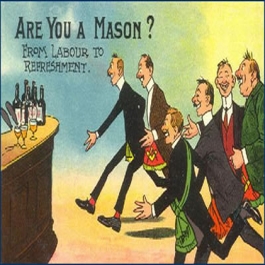
So what is a Table Lodge anyway?
Well according to the Masonic Dictionary, After the labors of the Lodge have been completed, Freemasons frequently meet at tables to enjoy a repast in common. In England and America, this repast is generally called a banquet, and the Lodge is said to be, during its continuance, at refreshment.
 This would seem more akin to what we would refer to as a Festive Board or English Festive Board. So lets examine what happens at a Festive Board (aka Table Lodge).
This would seem more akin to what we would refer to as a Festive Board or English Festive Board. So lets examine what happens at a Festive Board (aka Table Lodge).
The Master, of course, presides, assisted by the Wardens, and it is considered most proper that no profanes should be present. But with these exceptions, there are no rules specially laid down for the government of Masonic banquets.

It will be seen, by an inspection of the article Refreshment in this work, that during a the eighteenth century, and even at the commencement of the nineteenth, refreshments in a English Lodges were taken during the sessions of the Lodge and in the Lodge room, and then, of course, a rigid rules were in existence for the government of the Fraternity, and for the regulation of the forms in which the refreshments should be partaken. But this system has long grown obsolete, and the Masonic banquets of the present day differ very little from those of other societies, except, perhaps, in a more Strict observance of the rules of order, and in the exclusion of all non-Masonic visitors.
The table is in the form of a horseshoe or elongated semicircle. The Master sits at the head, the Senior Warden at the northwest extremity, and the Junior Warden at the southwest The Deacons or equivalent officers sit between the two Wardens. The Brethren are placed around the exterior margin of the table, facing each other; and the void space between the sides is occupied by the serving Brethren or attendants. It is probable that the form of the table was really adopted at first from motives of convenience. But M. Hermitte (Bulletin, Grand Orient, 1869, page 83) assigns for it a symbolism. He says that as the entire circle represents the year, or the complete revolution of the earth around the sun, the semicircle represents the half of that revolution, or a period of six months, and therefore refers to each the two solstitial points of summer and winter, or the two great festivals of the Order in June and December, when the most important Table Lodges are held.
The Table Lodge is formally opened with an invocation to the Grand Architect. During the banquet seven toasts are given. These are called Santes d’ Obligation, or obligatory toasts. They are drunk with certain ceremonies which are prescribed by the ritual, and from which no departure is permitted. These toasts are:
- The health of the Sovereign or Chief Magistrate of the State.
- Grand Master and the Supreme power of the Order, that is, the Grand Orient or the Grand Lodge.
- Master of the Lodge; this is offered by the Senior Warden.
- The two Wardens.
- Visiting Brethren.
- The other officers of the Lodge, and the new initiates or affiliates if there be any.
- All Freemasons wheresoever spread over the face of the globe.
One of the most curious things about these Table Lodges is the vocabulary used. The instant that the Lodge is opened, a change takes place in the names of things, and no person is permitted to call a plate a plate, or a knife a knife, or anything else by the appellation by which it is known in ordinary conversation. Such a custom formerly prevailed in England, if we may judge from a passage in Doctor Oliver’s Revelations of a Square (page 215), where an instance is given of its use in 1780, when the French vocabulary was employed. It would seem, from the same authority, that the custom was introduced into England from France by Captain George Smith, the author of the Use and Abuse of Freemasonry, who was initiated in a Continental Lodge.
So what is it we do in our Lodge when we say “Table Lodge”?
What we are doing is more accurately termed a “Casual Lodge” meeting. Since we are serving collation prior and we are not formalizing the meal with the all the pomp and circumstance. In this instance a Casual Lodge is appropriate and make the atmosphere more relaxed and less stress. If we were to actually engage in a table lodge or festive board we’d be eating and drinking during our meeting and no regular lodge business would be preformed.
Although the good news is I am planning a Lodge festive board for possible December. All routine Lodge business can be conducted with officers prior to the start of the festive board.
I hope you find this info interesting and informative and any questions or suggestions on what you’d like to see here are very welcome.
- Posted by William Arnold
- On September 17, 2020
- 1 Comment



1 Comment